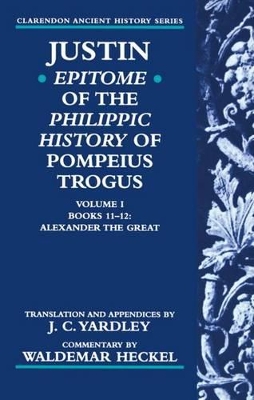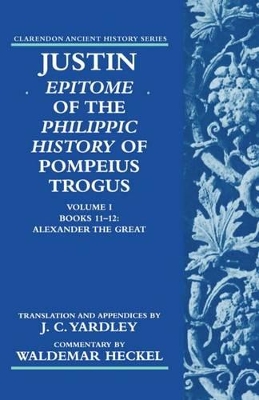Justin: Epitome of The Philippic History of Pompeius Trogus
2 total works
Justin: Epitome of The Philippic History of Pompeius Trogus: Volume I: Books 11-12: Alexander the Great
by Justin
Published 13 March 1997
Pompeius Trogus, a Romanized Gaul living in the age of Augustus, wrote a forty four-book universal history (The Philippic History) of the non-Roman, Mediterranean world. This work was later abbreviated by a certain M. Junianus Justinus, better know as Justin. This volume presents the first modern English translation and scholarly commentary on Books 11-12 of Justin's so-called "Epitome" of the history.
These books constitute one of the five major sources for the history of Alexander the Great and belong to the so-called "Vulgate" tradition, which in the opinion of many scholars derives ultimately from the lost historian Clearchus of Alexandria. The original work of Pompeius Trogus appears to have had stylistic and historical influences on the better know History of Alexander by Quintus Curtius Rufus.
In this volume the authors tease out and differentiate as far as possible the relative contributions of the historian Trogus and the "epitomator", Justin. The commentary examines the relationship of Justin-Trogus to both the extant sources and the works of the lost Alexander historians, and a serous attempt is made to explain errors or deviations from well-known sources in terms of the methods of historian and "epitomator" before resorting to the expedient of textual emendation. A second
volume, covering books 13-15, is forthcoming.
These books constitute one of the five major sources for the history of Alexander the Great and belong to the so-called "Vulgate" tradition, which in the opinion of many scholars derives ultimately from the lost historian Clearchus of Alexandria. The original work of Pompeius Trogus appears to have had stylistic and historical influences on the better know History of Alexander by Quintus Curtius Rufus.
In this volume the authors tease out and differentiate as far as possible the relative contributions of the historian Trogus and the "epitomator", Justin. The commentary examines the relationship of Justin-Trogus to both the extant sources and the works of the lost Alexander historians, and a serous attempt is made to explain errors or deviations from well-known sources in terms of the methods of historian and "epitomator" before resorting to the expedient of textual emendation. A second
volume, covering books 13-15, is forthcoming.
Justin: Epitome of The Philippic History of Pompeius Trogus: Volume I: Books 11-12: Alexander the Great
by Justin
Published 13 March 1997
Pompeius Trogus, a Romanized Gaul living in the age of Augustus, wrote a forty-four book universal history (The Philippic History) of the non-Roman, Mediterranean world. This work was later abbreviated by a certain M. Junianus Justinus, better known as Justin. This volume presents the first modern English translation and scholarly commentary on Books 11-12 of Justin's so-called 'Epitome' of the history.
These books constitute one of the five major sources for the history of Alexander the Great and belong to the so-called 'Vulgate' tradition, which in the opinion of many scholars derives ultimately from the lost historian Clearchus of Alexandria. The original work of Pompeius Trogus appears to have had stylistic and historical influences on the better known History of Alexander by Quintus Curius Rufus.
In this volume the authors tease out and differentiate as far as possible the relative contributions of the historian Trogus and the 'epitomator' Justin. The commentary examines the relationship of Justin-Trogus to both the extant sources and the works of the lost Alexander historians, and a serious attempt is made to explain errors or deviations from well-known sources in terms of the methods of historian and 'epitomator' before resorting to the expedient of textual emendation. A second
volume, covering books 13-15, is forthcoming.
These books constitute one of the five major sources for the history of Alexander the Great and belong to the so-called 'Vulgate' tradition, which in the opinion of many scholars derives ultimately from the lost historian Clearchus of Alexandria. The original work of Pompeius Trogus appears to have had stylistic and historical influences on the better known History of Alexander by Quintus Curius Rufus.
In this volume the authors tease out and differentiate as far as possible the relative contributions of the historian Trogus and the 'epitomator' Justin. The commentary examines the relationship of Justin-Trogus to both the extant sources and the works of the lost Alexander historians, and a serious attempt is made to explain errors or deviations from well-known sources in terms of the methods of historian and 'epitomator' before resorting to the expedient of textual emendation. A second
volume, covering books 13-15, is forthcoming.

